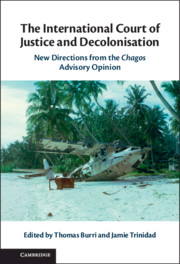 The International Court of Justice and Decolonisation
The International Court of Justice and Decolonisation Published online by Cambridge University Press: 13 February 2021
This chapter considers the UK’s assertion of sovereignty over the Chagos Archipelago in the wake of the Advisory Opinion of the International Court of Justice (ICJ) in Legal Consequences of the Separation of the Chagos Archipelago from Mauritius in 1965. It will be argued in this chapter that the UK’s assertion to sovereignty is tenuous as it rests on weak foundations which are increasingly undermined by the colonial context in which the then colony of Mauritius agreed to the detachment of the Chagos Archipelago. The UK’s sovereignty over the Chagos Archipelago is contested by Mauritius (and by the majority of countries that have given their support to the campaign to force the return of the territory). The Republic of Mauritius first challenged the UK’s sovereignty at the United Nations General Assembly (UNGA) in 1980, some twelve years after gaining its independence.1 The Court’s Advisory Opinion is a landmark in terms of how sovereignty over the Chagos Archipelago must now be approached.
To save this book to your Kindle, first ensure no-reply@cambridge.org is added to your Approved Personal Document E-mail List under your Personal Document Settings on the Manage Your Content and Devices page of your Amazon account. Then enter the ‘name’ part of your Kindle email address below. Find out more about saving to your Kindle.
Note you can select to save to either the @free.kindle.com or @kindle.com variations. ‘@free.kindle.com’ emails are free but can only be saved to your device when it is connected to wi-fi. ‘@kindle.com’ emails can be delivered even when you are not connected to wi-fi, but note that service fees apply.
Find out more about the Kindle Personal Document Service.
To save content items to your account, please confirm that you agree to abide by our usage policies. If this is the first time you use this feature, you will be asked to authorise Cambridge Core to connect with your account. Find out more about saving content to Dropbox.
To save content items to your account, please confirm that you agree to abide by our usage policies. If this is the first time you use this feature, you will be asked to authorise Cambridge Core to connect with your account. Find out more about saving content to Google Drive.